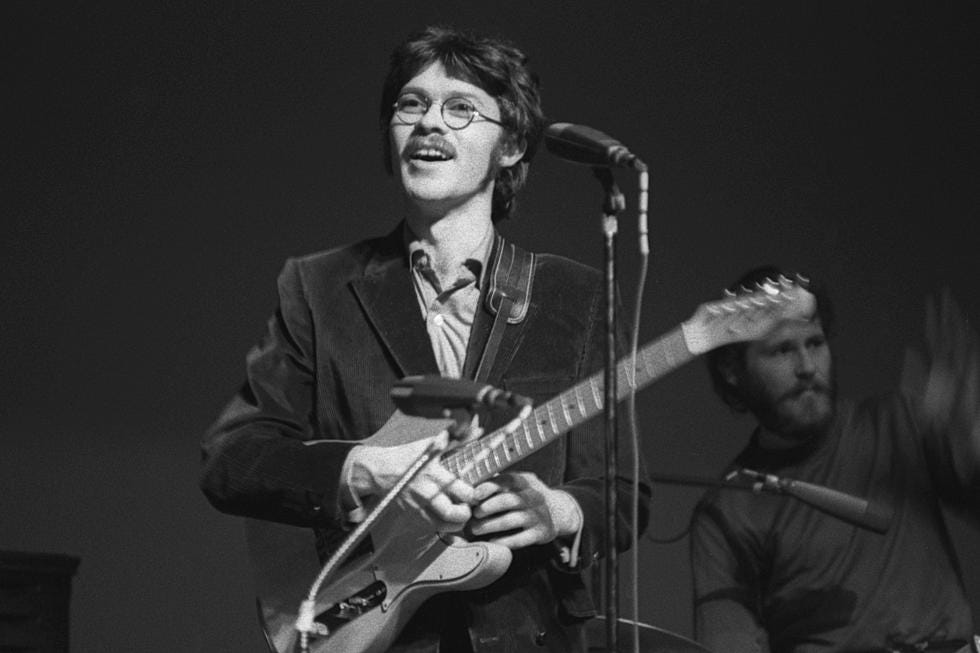A Tribute To the Late Great Robbie Robertson of The Band
On lyrical tension between the sacred and profane.
Image: ultimateclassicrock.com
I've often wondered how it is that musicians who didn't lead such exemplary lives were able to make such elevated art. And I long ago concluded that the high parts come from the human essence (soul) and the rest from their physicality, which tends to exert a negative influence.
In the classic documentary The Last Waltz, The Band’s fantastic keyboardist, Garth Hudson said, “There's a view that “Jazz is evil because it comes from evil people. But actually, the greatest priests on 52nd Street and on the streets of New York City were the musicians. They were doing the greatest healing work, and they knew how to punch through music, which would cure and make people feel good.”
Now, I might argue that it's not always just about feeling good, but his point is well taken. There's a certain risk where musicians go in order to create that happiness in us, and truth be told, it can often chew them up and leave them for dead—if they're not careful. There's something almost Promethean in scaling those musical heights and bringing down the fire. Check out this sentiment in their song Forbidden Fruit:
This is such a great tune. It’s much poppier sounding than some of their other work. And listen to this section between 1:35-1:55 and tell me they're not anticipating the upcoming disco revolution. It's just great stuff. And in terms of the lyrics, they say:
High and lonesome out on Times Square, haven't got a dime, ain't got a prayer. Deliver us Lord from this golden calf. People only want what they cannot have. How can I walk with this ball and chain? How can I land in this hurricane? Or is this part of man's evolution to be torn between truth and illusion? Forbidden fruits, that's the root that you better not take forbidden fruits. Just watch out for the sign of this snake.
The Band liked to use biblical themes as a linkage between humanity's tendency to pursue falsehood and cheap substitutes for what is ultimately and truly pleasurable and long-lasting. The golden calf and the snake are symbols of this myopic tendency— to have what is easy and fast while by and large, true pleasure, which I would define as a transcendent pleasure, takes quite a lot of time and effort to develop.
And though they sing about it and seem aware of it, most of the members of the band struggled with addictions and had fairly tough lives. Interestingly, guitarist, Robbie Robertson, used drugs specifically to attempt to generate transcendental experience. In an interview they asked him once,
Have you taken peyote?
Sure.
Did you get that direct line to God?
Yeah, it's such a natural part of us. But people go to churches and an interpreter, a priest, rabbi, whatever, says, okay, I'll see if I can get you in touch with God. This says, no interpreter necessary.
I get where Robbie is coming from, but I don't agree that religious leaders are the conduits to get us to God any more than a personal trainer is a conduit to fitness. They are resources, wells of inspiration. But at the end of the day, each individual is solely responsible for his or her own spiritual well-being.
I’d like to share one more of my favorite tunes—To Kingdom Come from their 1968 debut album, Music From Big Pink.
Another fantastic song. I love the vocals shared by Robbie and Richard Manuel here. From 1:15-1:39, if I close my eyes, I hear Sly and The Family Stone. I also love the carnival piano and organ and the psychedelic guitar work. And once again, the band gives us biblical themes. The golden calf and bearing false witness. And of course, the title Kingdom Come, an area of theology known as eschatology or anticipating the end of days in most spiritual traditions.
This is a time associated with peace, joy, and universal harmony. Almost all people can identify with this desire. And though there are very many stumbling blocks along the road, I subjectively think that we'll eventually get there. In the meantime, we have the music to walk us down the path.
RIP Robbie.




WoW, this was the last thing I expected to see here. THANK YOU SO MUCH for including this in the series. I do definitely believe that The Band's music was both sacred and profane. Being at the many Band concerts I have attended--I think it was 39--I can attest that I felt the oneness of it all and the connectedness with the people and with G-d. I didn't need any drugs to do this. The music was enough to transport me to where I wanted to go.